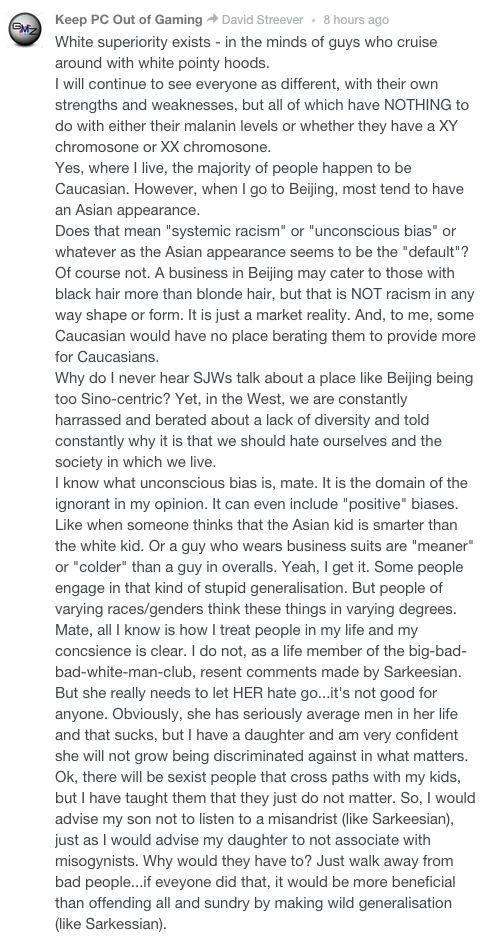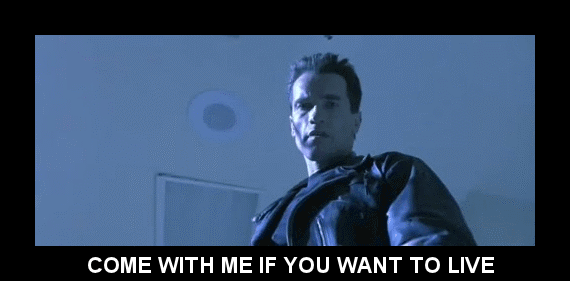Those of us who speak often about diversity – particularly in gaming, but it’s an issue for all mediums – are often faced with similar responses. I want to reply to some.
Throat clearing
Let’s first be clear about what diversity support is: The call to have more games include people of colour, trans folk, etc., is about wanting more, not less.
We want not mere inclusion of, say, black characters, but ones who aren’t all gangsters (as in Watch Dogs); transgender folk who aren’t solely included as targets of transphobic jokes (as in Grand Theft Auto V); women who aren’t caricatures or replaceable with inanimate objects (too many to list).
Diversity is about the recognition that other people partake of a medium, are worth representing within those mediums as people, and who have certain issues particular to that group that are worth exploring in a respectable way.
The question about what to do with this recognition is where difficulty lies. But the responses to such a cause help no one.
Common, wrong responses
“Not every game has to cater to a minority!”
No one is saying every game has to. The call for more games to include and deal with issues that affect various kinds of people is not a call for every game to meet some magical quota. I don’t even know what such a measure looks like. I also don’t really know what “catering to a minority” means.
Diversity campaigning means “cater to all/more people – not just some”. Saying diversity is “every game must cater to a minority” is the exact opposite of the overarching goal of “more”.
We’re highlighting too many games already cater to one demographic (straight white men); in other words, games already cater to one group. We’re saying try make stories about more than one group of people; lots of cultures, nationalities, abilities, etc., exist. We’re all interested in games.
“Let artists create what they want!”
If you wish to make your game star another white man, that is entirely your choice. But it’s still a choice and we will and can criticise you for it. Just as you are totally free to make your lead character another boring white dude, we use that same freedom to criticise you.
Whatever your reason – publishers force you, “the market” decides, etc. – it’s still a choice to focus on the stories of white men. It’s still a choice to disregard other voices or cultures or people. There is no law you’re adhering to.
Make whatever you want: that’s freedom.
The ability to criticise art and artistic choice: that’s the same freedom.
We either both have it or neither of us do.
“It’s bad for business.”
I’m not sure how you ignore examples where a diverse cast led to the biggest profits a franchise had. We’ll ignore women leads sell better – again and again. Since when is it smart business practice to ignore substantial potential audience base?
Do you really want to be fostering an audience that is outwardly repulsed by the idea you treat women respectably? That maybe people of colour don’t have to be terrorists or gangsters? Is that the type of audience you want supporting your work? If not, then you can include other kinds of people and know that the alleged original audience of straight white dudes will continue to support you, because you’re good, talented, creative.
The men who loved Half-Life, which starred a power fantasy version of many of them, didn’t abandon Valve when Portal starred a woman. How belittling of yourself, your audience and the rest of us, when you view your audience based on the most bigoted.
But here’s a black/women/etc. character! Why are you complaining?
Highlighting the existence of a minority individual doesn’t disprove the problem of majority. No one is claiming such stories or characters do not existence – we’re saying it’s too common, too predictable for stories to focus on the plight of straight white men.
For example, if Idris Elba was cast as James Bond, that doesn’t disprove or undermine that James Bond was/is always a white man. It highlights Elba is an exception and that very fact he’s an exception is the problem.
When you point out a game that focuses on a well-written black character – say Lee, from Telltale’s The Walking Dead (who is, unfortunately, a criminal) – you don’t disprove Arkham Asylum, City, Knight, Watch Dogs, Dying Light, Assassin’s Creed (AC) 2, AC: Black Flag & AC: Unity, Witcher 1, 2, 3, Far Cry 1, 3, Lords of the Fallen, Max Payne, Alan Wake, etc. etc. etc. etc. all star and focus on the stories of straight white men.
We already know about the few games that do people of colour well. We’re saying they shouldn’t be an exception, not they don’t exist.
Just be good: who cares if they’re black or white, man or woman?
It’s easy to not care about race or gender or sexuality when yours is the one that’s catered to by default. I am told constantly by white men that race isn’t an issue (which, makes me wonder: if it’s not an issue, why are they fighting me about it?); men constantly tell women to “calm down”, because, hey, Lara Croft exists. And so on.
The way this is framed is that it doesn’t matter if a character is a woman or person of colour or gay, just as long as they’re well written. This gives the impression that straight white men are inherently well-written and you need to make some kind of case for your person of colour lead.
The actual point is this: You need to make all characters, regardless of race, gender, good (or interesting or, at least, not boring/Aiden Pearce). We can all agree on that. But when you use that assertion when people are calling for diversity, you’re diverting the issue. We’re not talking about quality of characters, we’re talking about inclusion. If race doesn’t matter to you, then stop getting involved when people of colour mention inclusion. Why would we want a badly written person of colour in a game? That could be worse than their non-existence.
Your point is either pointless (of course they must be well written!) or diverting (focusing on characters’ quality rather than their inclusion).
Conclusion
Diversity matters to many of us: if it doesn’t matter to you, please rather just ignore our conversations. You don’t really prove you lack of caring when you try divert complex discussions about diversity. You also don’t help when you make the same talking points we’ve been dealing with for ages. Help yourself or help us, but please don’t be boring and distracting.


